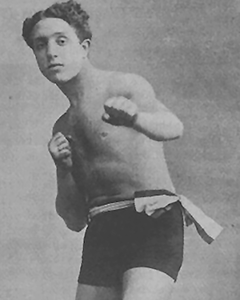
Born in 1886 as Harry Besterman, Harry Lewis was recognized as welterweight champion of the world from April, 1908, to March, 1911. Nat Fleischer, founder, editor & publisher of “The Ring” magazine, rated Lewis the sixth-greatest welterweight of all time. With a strong jaw, and an impressive defensive style, Lewis was knocked out only twice in 172 fights spanning his 10-year career.
The family moved from New York City to Philadelphia when he was a child. At 17, he began boxing professional as a featherweight (126 pounds) in 1903 and took his ring surname “Lewis” from a local fight manager.
Moving up to lightweight (135 pounds) in 1905, he quickly demonstrated his potential as a serious contender. Considered an expert counter-puncher, Lewis’ early and mid-career were characterized by powerful left hooks to the body.
Future rival Willie Lewis said Harry Lewis “specialized in knocking out guys who never were knocked out before. Harry Lewis was an artist in feinting and countering. His punches only went a few inches, but boy what authority they carried.”
Lewis boxed Hall-of-Fame and reigning World Lightweight Champion Joe Gans in Philadelphia in 1906. Though the fight ended in a six round No Decision, Lewis was viewed as a future champion despite being down twice. He had competed favorably with one of history’s greatest lightweights.
Lewis claimed pieces of, and then all of, the world welterweight championship in 1908 with victories over Frank Mantell, Terry Martin, and Honey Mellody. He held the crown for three years.
Unable to make the welterweight limit in 1911, Lewis relinquished the title and fought almost exclusively as a middleweight. With fights in France and England, Lewis and his friend Willie Lewis fought twice in front of packed houses. Both bouts were billed as world welterweight title fights. Each fight went 25 rounds and even as draws.
Lewis boxed until 1913, the year he suffered a head injury after being involved in a traffic accident while riding in a taxi. Taken to the hospital, he was diagnosed with a blood clot on his brain. He was 27 years old when he retired and he suffered from partial paralysis the remainder of his life.
Lewis was inducted into the International Jewish Sports Hall of Fame in 2002 and into the International Boxing Hall of Fame in 2008.
